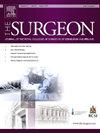术前洗必泰冲洗对减少肾移植手术后肺炎的积极作用。
IF 2.3
4区 医学
Q2 SURGERY
Surgeon-Journal of the Royal Colleges of Surgeons of Edinburgh and Ireland
Pub Date : 2025-02-01
DOI:10.1016/j.surge.2024.07.001
引用次数: 0
摘要
背景:术后肺炎是最常见的医院获得性感染之一,会增加术后死亡率。此外,它还使医疗系统承受着沉重的经济负担。对于临床医生来说,预防术后肺炎是一个极具挑战性的问题。由于接受了免疫抑制治疗,肾移植患者更容易发生术后感染。目前还没有科学文献关注术前使用洗必泰消毒液进行口腔护理对肾移植手术病例术后肺炎的影响。在本研究中,我们对这一课题进行了研究:2020年8月至2022年8月在我院进行了一项前瞻性随机临床试验。A组A组:术前接受0.12%洗必泰口腔冲洗;B组:术前未接受0.12%洗必泰口腔冲洗。我们使用卡方检验或 t 检验分析了两个试验组之间的差异。对分类数据采用曼-惠特尼 U 检验:结果:A 组有 9 名患者(17.6%)被诊断为术后肺炎,B 组有 14 名患者(25.9%)被诊断为术后肺炎:为了降低肾移植手术患者术后肺炎的风险,包括 0.12 % 洗必泰漱口水在内的口腔保健方案似乎是有益的。本文章由计算机程序翻译,如有差异,请以英文原文为准。
The positive effects of preoperative chlorhexidine rinse to reduce postoperative pneumonia after kidney transplantation surgery
Background
Postoperative pneumonia is one of the most observed hospital-acquired infections and increases the postoperative mortality rate. Further, it drives the healthcare systems under a severe financial burden. Preventing postoperative pneumonia is an incredibly challenging issue for clinicians. Since immunosuppression therapy, the patients who had kidney transplants are more vulnerable to postoperative infections. There is no data in the scientific literature focusing on the effects of preoperative oral care with chlorhexidine antiseptic solutions on postoperative pneumonia in kidney transplantation surgery cases. In the present research, we studied this topic.
Methods
A prospective, randomized clinical trial was conducted at our institution between August 2020 and August 2022. Group A: Received 0.12 % chlorhexidine oral rinse preoperatively; Group B: Not received 0.12 % chlorhexidine oral rinse preoperatively. We analyzed the differences between the two trial groups using a chi-square or t-test. The Mann-Whitney U test was used for the categorical data.
Results
Nine patients (17.6 %) were diagnosed with postoperative pneumonia in Group A and fourteen (25.9 %) in Group B (p < 0.05). Hospitalization time of Group B was prolonged (p < 0.05). In multivariate analysis, significant risk factors associated with postoperative pneumonia were advanced age, diabetes mellitus, smoking, delayed graft function and not gargling with 0.12 % chlorhexidine (p < 0.05).
Conclusions
To reduce postoperative pneumonia risk in patients undergoing kidney transplantation surgery, an oral health protocol including 0.12 % chlorhexidine mouth rinse seems beneficial.
求助全文
通过发布文献求助,成功后即可免费获取论文全文。
去求助
来源期刊
CiteScore
4.40
自引率
0.00%
发文量
158
审稿时长
6-12 weeks
期刊介绍:
Since its establishment in 2003, The Surgeon has established itself as one of the leading multidisciplinary surgical titles, both in print and online. The Surgeon is published for the worldwide surgical and dental communities. The goal of the Journal is to achieve wider national and international recognition, through a commitment to excellence in original research. In addition, both Colleges see the Journal as an important educational service, and consequently there is a particular focus on post-graduate development. Much of our educational role will continue to be achieved through publishing expanded review articles by leaders in their field.
Articles in related areas to surgery and dentistry, such as healthcare management and education, are also welcomed. We aim to educate, entertain, give insight into new surgical techniques and technology, and provide a forum for debate and discussion.

 求助内容:
求助内容: 应助结果提醒方式:
应助结果提醒方式:


